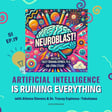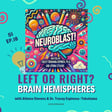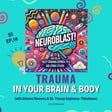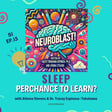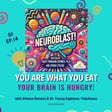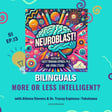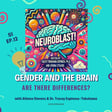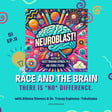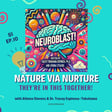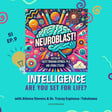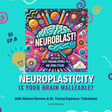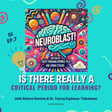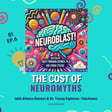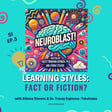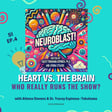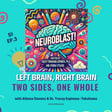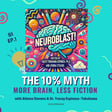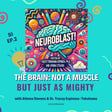Become a Creator today!Start creating today - Share your story with the world!
Start for free
00:00:00
00:00:01

Cool Head - Better Decisions?
In this Neuroblast episode, Athena and Tracey Tokuhama-Espinosa debunk the myth that emotions hinder good decision-making. They explain how emotions and logic work together in the brain, influencing attention, memory, and judgment. Rather than avoiding emotions, embracing them can actually lead to wiser, more balanced decisions in real life.
Original music by: Julian Starr
Transcript
Introduction and Guest Intros
00:00:00
Speaker
Hello brains and and collection of 30 trillion cells that we call people. This is Nerd Blast.
00:00:24
Speaker
I'm a Venus Stevens actor, writer, apparently a whole lot more bacteria than I am myself. And I'm Tracy Takahama Espinosa.
00:00:38
Speaker
I teach a course at Harvard University Extension called the Neuroscience of Learning and Introduction to Mind, Brain, Health, and Education.
Human Microbiome and Fascinating Facts
00:00:45
Speaker
And I'm an international educational consultant. Tracy, before we begin, how crazy is it that we have a more bacteria in us than we have cells in us we just happen to be 30 trillion cells?
00:01:04
Speaker
that seem to think we know what we're doing. I know. Isn't it wild to think that we are the only creatures on earth who actually think about how we think we think?
00:01:17
Speaker
I was about to say, I think my cat does. Maybe your cat, maybe. I don't know about all of course scientific evidence, but yeah. If you want to go into an existential crisis, fellow human beings, think about how you think, and think about how you're thinking about how you think.
00:01:40
Speaker
That will be a wrap at home that will take you a good long time to get out of.
Emotions and Cognition: Interconnectedness
00:01:46
Speaker
Speaking of thinking, today we're tackling a classic myth. I mean, we're talking classic as in and then flowing, as in green, as they say in social media.
00:02:05
Speaker
People who make decisions with cool heads. make better choices. Right, we hear this all the time. Don't get emotional.
00:02:16
Speaker
Keep a level head. Emotions are bad it clouds your judgment. So Tracy, what is going on?
00:02:27
Speaker
is it true? Because I've definitely seen Some people make some pretty stupid decisions. I'm not saying that one of them, but my mother might disagree.
00:02:42
Speaker
Well, I think the key here is understanding that different types of decisions take different amounts of time. And that the key to all of this is that emotions and cognitions are not distinct functions in the brain. I mean, your brain is dealing with both of those things, right? It's not that the...
00:03:00
Speaker
emotions are in your heart and the thinking's in your brain. And then we've got to just join these two things, as you see in a lot of comic strips. But basically, that emotions and cognition work in tandem, and that high-functioning systems really make better decisions. But a lot of that has to do with rehearsal, not just the fact that there are different kinds of mechanisms that might be running in parallel, but the fact that we simply don't rehearse decision-making neural networks enough.
00:03:28
Speaker
So I say this myth is a classic for a reason. Where did this start? Why? give us a history lesson.
Regulating Emotions and Cognition
00:03:39
Speaker
Well, mainly we thought that they were totally separate functions because we thought that different organs ran different shows, right? Your heart was running your emotional show and your brain was running your cognitive show and and that they didn't really you know have that that general conversation. Now we know that your brain does everything. Your brain is in charge of both things. And so understanding that your brain can make you have emotional states of feeling in love or or feeling angry or but whatever emotional state you might have.
00:04:18
Speaker
We oftentimes think of emotions as conflicting with our ability to to make decisions because we think of one as being in your head and the other being in your heart. Well, we now know that they're together and that, you know, emotions are not always irrational and decision making doesn't always have to be poor because it's coming from those different types of networks. But the main idea is that they work in tandem and that we have to have a better practice at doing things. It it comes it boils down to time.
00:04:49
Speaker
Good decisions, bad decisions is how much time you need. And you need less time when you re rehearse those networks. But what we often find is that people have not rehearsed decision-making networks very well.
00:05:00
Speaker
So they make dumb decisions because they're quick in the time and they feel that their emotion urges them to do that. That's not always true. Really, this goes way back.
Ancient Misunderstandings of the Brain
00:05:10
Speaker
We're talking about ancient Greece and Aristotle and the Academy in Plato.
00:05:18
Speaker
We're talking about the Egyptians that really did divvy up what organs did what. We know this because of their burial practices. They just took out the brain because they did not know what it was for. This really is embedded in human history, this division.
00:05:42
Speaker
Yes, and it it wasn't until, you're absolutely right about the the Greeks, and and there was a huge debate about, you know, where where does the soul reside? Because that was thought to be so much more important than figuring out brain, body, or emotional functions. But where does the soul arise? And there's a wonderful book, um it's called The Soul Made Flesh by Zimmerman, which was actually one of the first to historically document looking at what happened in the 15th, 16th century as people began to understand the role of the brain.
00:06:13
Speaker
and how the brain was actually everything. And that was a real, you know shocker to everybody, because it wasn't just emotion and cognition, it was also faith. um And, you know, it's in the brain, which was pretty fascinating to see how belief systems also come out of that. And so, yeah, historically speaking, we've always sort of tried to divvy up things, um for our own sense, we find it simple to be able to say, oh, the heart does this and the brain does that.
00:06:40
Speaker
um Or we say this part of the brain does this or this this part of the brain does the other thing, when it's really much more a huge and complex and interwining intertwined system um that is really ah very difficult. They're happening simultaneously. You never stop thinking. You never stop having emotions. They're happening simultaneously all the time.
Science of Decision-Making and Emotions
00:06:59
Speaker
and in a And there is no decision without emotions. Just physiologically speaking, how information, how sensory perception occurs and how it goes through your memory systems and then how you react to it um just basically confirms there's no way that you can have decisions or think without an emotional state.
00:07:18
Speaker
So when you said that this summer, I'll repeat it again, there are no decisions without emotions. It was like my entire world offended.
00:07:33
Speaker
Particularly being told at Harvard, there are no decisions without emotions. Break that down into science. I think the first person or the person at least that I admire most who who's really explored this is Antonio Damasio in USC. his His whole work looking at the we feel therefore we are kind of things or we we feel therefore I am.
00:07:58
Speaker
ah Sorry, going to start all over. Antonio Damasio is really one of the most ah eminent speakers on this, and his students, Mary Helen Immortina Yang, both at USC in California, have been just true leaders in demonstrating, physiologically speaking, how it is that emotions and cognition reside simultaneously in the brain, and that it's impossible to come to any kind of thinking without having that emotional state. It's just how your brain is structured to process those signals. There's nothing that separates those things. And so that's a huge piece to take away because it also takes away the excuse that, no, you know i I was just so emotional, i I made a bad decision. Well, the truth of the matter is, and here's a classic example, it's of adolescents and teenagers. we think ah do you think that teenagers always make great decisions? No.
00:08:52
Speaker
I mean, i think it would be wise not to answer that question. So that just shows you're beyond your teen years. but But we have this whole idea that, you know, adolescents, oh, they're all crazy. They all make stupid decisions and all the rest of it.
00:09:08
Speaker
Well, what's fascinating is most adolescents don't make stupid decisions, but what they do not have is a well-rehearsed network for decision-making.
00:09:19
Speaker
And so we find that even younger kids who've been given the opportunity to make you know low stakes decisions early on in life, who practice and rehearse that, actually when push comes to shove and they have to make a quick decision, they've rehearsed those networks so well that they're able to then make good decisions. And so
Teen Decision-Making Skills
00:09:38
Speaker
um they're not overwhelmed by their emotional state because they have rehearsed those networks for decision making. And so we know that the whole system, the network involved in making good decisions is something that has to be rehearsed over time. And it's actually something that um
00:09:55
Speaker
we don't We see a lot of teenagers being asked to make hard decisions quickly, and they don't have the time because they haven't rehearsed those networks, so they do make stupid decisions. So it's not that all teenagers are crazy, but that basically we need to rehearse different networks before they can be called upon seamlessly.
00:10:14
Speaker
This is so interesting thing to me because I've definitely been at fault for looking at a child that appears older and very often acts older.
00:10:27
Speaker
And then they do something that is completely age-appropriate, but it feels age-inappropriate because they so often reach above their age range.
00:10:45
Speaker
And you can see, if we take this even to an extreme, I mean, it's across the the the lifespan that we we refine our ability to make good decisions. But what's really interesting is that, you know, if you have a bigger toolbox that you can reach into, you're likely to quickly make efficient or good decisions better than somebody who just hasn't had the practice, which is why, you know, typically speaking,
00:11:09
Speaker
Kids are less you know skilled at this because they just haven't rehearsed those networks over time. And so um giving children the appropriate, ah you know maybe low stakes decision making options, you know where where what should we eat for dinner? What are the pros and cons? let's Let's think about the benefits, drawbacks.
00:11:30
Speaker
If you can do that over time, it actually becomes very fast, which means that independent of your emotional state, you're likely to be able to reach into that and make better decisions. um without having to you know fall prey to your emotional state.
00:11:44
Speaker
In parents, there is a great kids book about this picture your book by Brian Smith called it, What Were You Thinking? But I feel like I can say, what were you thinking you eli to a lot of the adults in their life?
00:12:02
Speaker
Oh, yeah. What are we thinking that when we... lose control and decisions in the heat of the moment.
00:12:13
Speaker
Are you thinking you would say yes? Question mark? I agree that there's so many different ways that we might approach decision-making in the brain, but the networks are pretty clear. It's pretty much your brain is assessing, okay, what's this new information?
00:12:29
Speaker
What's the problem in front of me? Now what do I do? And it's using what it has in prior knowledge and it's using the networks that exist. So this is also why some people make decisions.
00:12:42
Speaker
Terribly ah drastic decisions based on emotional states simply because it's worked for them in the past. So we know people, some people go totally unfiltered and then they think that ah they they make statements and it works for them. Well, if something has worked and it's been confirmed, then people continue to make decisions in that same way. And so it's just a reinforced kind of of a behavior. But decision-making itself, um hopefully it's...
00:13:08
Speaker
seen as something that has to be taken seriously and it's important, but also understanding that emotional states can impede access to certain types of memories that we need to have in place to be able to make good
Understanding Emotional Intelligence
00:13:24
Speaker
decisions.
00:13:24
Speaker
But if we rehearse them enough, they won't be impeded. So part of the idea is to have that rehearsal of those networks in place so that they don't become slave to the emotion. When we say immersion is emotional regulation, what are we talking about?
00:13:42
Speaker
Well, in the simplest sense, if you think of emotional intelligence, and that was made really popular by Goldman, but it's been actually a measurable theory since the 80s with Salovey and Myers.
00:13:55
Speaker
But they basically look at this as ah as a four-quadrant grid. If you took a square and you put a cross in the middle of it, and and basically they look at two different dimensions. One was the dimension of self and other,
00:14:09
Speaker
And the other was of labeling, naming, understanding, and then managing. And what they said is emotional regulation begins with the simplest idea that I can recognize the emotional state that I have.
00:14:25
Speaker
And then I work at it, I can actually manage that and control it. But next, I could actually see emotional states in others. I could really identify when that person looks happy, sad, angry, whatever.
00:14:39
Speaker
And then I could manage that. And through the dialogues that we have, we can might maybe even change the way those other people are are thinking. So emotional regulation is the ability to first recognize emotional states and then manage them within yourself and others.
00:14:57
Speaker
And how does emotional regulation in cognitive processing work? have been together. Last episode episode, we were talking about getting big releases of releases of adrenaline causes us to jump out of the way of a snake.
00:15:21
Speaker
But yet, you are telling us now that there's also cognition in that. When it feels like your body is being overridden by these chemical floods,
00:15:35
Speaker
How can there still be cognition when your body does something impulse, even when it is the right thing to do to get out of the way of that snake?
00:15:48
Speaker
So this is kind of that meta-meta thinking, isn't it? So when you think about how you're thinking, so if you are aware, for example, if you're aware that...
00:15:59
Speaker
You begin to breathe deeply and kind of almost feel panicked and want to run away when you're about to make a big speech in front of your class or something like that. If you're aware... that part of the reason you're breathing faster is because you're getting less oxygen because you need to, okay, if you take if you slow it down, if you're aware of your bodily reactions to that emotional state, you can then sort of take care of that, dominate that, work with it and change it, right? So I'm sure that you recall when you were acting and going on stage and then you can have that kind of nervousness beforehand, you can either embrace it and understand what it is and work with it
00:16:38
Speaker
and turn it to your advantage, or you can fall prey to it and then, you know, fail miserably. And so part of the idea is rehearsing that enough, understanding at a cognitive level what's going on physiologically in your body so that you can manage that, right? When I get ready to go on stage, to some extent there is still no less Now, unless it's opening night or a one-time gig, but one of the best pieces of I've ever received was from a fellow actor at the Royal Shakespeare Company that said, those nerves, those emotions are always going to be there.
Transforming Nervousness into Excitement
00:17:24
Speaker
yep Don't fight them because they are natural. You just need you leave to learn to
00:17:30
Speaker
accept them and definitely there are moments around opening night and early production shows where I'm talking and here comes that feeling why am I in this industry again because I've signed up for feeling this every single night so that's a perfect example of all the whole you know it's coming rather than going, no, that's bad, you shouldn't feel that way, you should feel nothing.
00:18:09
Speaker
i've just had to go and here they come again. Well, here's let's let's take it another step further, which is really quite quite interesting because feel it that your emotional state can actually be super beneficial in so many of those different cases if you know how to leverage what's happening in your body.
00:18:29
Speaker
And the big key idea here, and this was Antonio Damasio's idea, is that emotions and feelings are different, right? Emotions are of the body. That is that chemical release that makes your body want to do something or breathe quicker or or your knees feel like they're shaking or whatever it is.
00:18:48
Speaker
That's of the body. Psychological state is your habituated reaction to the emotion. So how do I feel about it? So as your friend said, it's inevitable. Those emotions are going to be there. You really can't do anything about that.
00:19:01
Speaker
But you can decide how you feel. about that, which is a very big, huge idea because then you can say, okay, now I can leverage that. I can take that kind of nervous energy and turn it into something very positive in my performance and and things like that. And so you can choose what you do with the emotional state. And that is another level of decision-making that's really, really important to consider.
00:19:26
Speaker
so the advice of stay calm and think logically,
00:19:35
Speaker
To what degree is that always going to be possible? To what degree is that limiting how well we make our decisions? To what degree is that about making better decisions?
00:19:50
Speaker
Or is the devil in the detail? You know how people oftentimes connect with that and they say, okay, wait, breathe, count to 10 before you say anything. Okay.
00:20:01
Speaker
So they're what are they doing? They're buying time. So here, going back to the very first idea here, if you the the advice is is not you know keep a cool head so you can make decisions. It's basically rehearse decision-making neural networks so that time doesn't matter.
00:20:18
Speaker
The more you rehearse something, the faster you can retrieve it and use it. And so if you've practiced those good skills over time, that pressure that you might feel because of the emotional state will no longer matter.
00:20:31
Speaker
And so that's a key element to to keep in mind there is that, you know, and embrace those emotional states. I think one of the most ah impacting outcomes of all of this is that in the research that Adele Diamond has done, she's really pointed to several studies that show that Emotional regulation, you know, understanding how to harness this, leverage it, use it, um ignore it.
00:20:53
Speaker
um In our cognitive states, emotional regulation accounts for almost double innate intelligence in terms of learning outcome. So being able to manage that, to be able to make those quick decisions, to leverage your cognitive states, even if you're in a heavy emotional state, is really key to not only you know happiness, well-being, and functioning in life, but also does well in academic outcomes. And so understanding, getting more in tune with how emotions influence our feelings, and then also rehearsing how that influences our decision-making is a really big part of um just you know living up to our full potential in life.
00:21:33
Speaker
I am about to take you on a left turn, and that is, is this part of the reason why denial is so dangerous?
00:21:47
Speaker
And it's so detrimental to the whole, I'm not going to think about that because it makes me uncomfortable. ah who That's a really interesting left turn, and I really appreciate how you announce it because I just do it. I don't ever tell you I'm going on a left turn.
00:22:06
Speaker
but We have a topic here on the podcast between Tracy and me that I'm up in the Apache helicopter trying to figure out where she's going.
00:22:19
Speaker
So left the people that don't think about making maybe an upcoming decision that they are going to be emotional in.
00:22:32
Speaker
Does that put them in a disadvantage? Yeah, it does. And I would say that, you know, we go back, you you mentioned the Greeks earlier, and I would just reiterate something, which is, I think it's the very first educational lesson that we ever had, which was know thyself.
00:22:47
Speaker
And I think that... You can't know yourself if you're bearing parts of yourself. And so saying, I'm not going to deal with this. I'm not going to look at this. I'm not going to face this is oftentimes one of the worst things you can do because it it doesn't allow you to work through. Okay.
00:23:02
Speaker
So here's my decision-making, my scenario planning in my head. If this happens, this will happen. If this happens, the other thing will happen. you start to gather greater amounts of data and think more broadly about yourself and the world.
00:23:15
Speaker
um So knowing yourself means also being real with the emotional states you have, but also understanding that those things, you know, it's in your control. it's it's You do have the free will to be able to um choose whether or not you're going to pay attention to those emotional states or not.
00:23:32
Speaker
And or leverage them to make better decisions throughout life. So at some points, we know these emotions are coming.
00:23:43
Speaker
I hate them. I get more of them than most.
Constructive Use of Emotions in Decisions
00:23:48
Speaker
What can we do to leverage that? What do you mean by leverage that? How do you we make this, if not comfortable, how do we make it better so that we are incorporating our emotions into decision making.
00:24:11
Speaker
I think one of the first steps might sound a little bit clinical, but just understanding that emotions are nothing more than a release of your brain of certain chemicals, and that's triggering that emotional state, but that your mind can choose what to do with that.
00:24:28
Speaker
and that you're actually in charge. And it's actually a wonderful thing that we see with even three-year-olds. You tell them about emotional intelligence and you say, you begin by labeling. you know i see that you look really angry because you know John took the ball from you, cause and effect, and this is the emotion that you're experiencing, right?
00:24:48
Speaker
Then you say, now what do you want to do about it? basically saying you are not a slave to that emotional state. You don't have to blurt out or hit him or do whatever. You get to choose how you feel.
00:25:03
Speaker
And you'll oftentimes, and not believe it or not, I've seen a real kid say, well, I feel sorry for him that he had to that he took the ball instead of asked to play with all of us, which is really fascinating. So you can his initial emotion made him want to punch the kid out.
00:25:21
Speaker
But when you asked him to process that, now how do you feel and to realize you're in charge of that, you're in control of that, that's an incredibly powerful thing to do in life is to be able to say, I can take that emotional state and decide how I'm going to react based on a new feeling that I'm assigning to this emotion. So Think that through because I do think that's a benefit in in terms of making good decisions, that you're not a slave to your emotions when it comes down to it. um It's just a matter of rehearsal and because the time we have is usually really short and it's easier to react to an emotional state than it is to sort of process these things out in parallel.
00:25:58
Speaker
So, talk of name, rehearse, but how is rehearse different than ruminate? Oh, that's a really great question. Rumination is where you go and in an infinite circle and a negative negative decline, right? so Rumination is negative.
00:26:16
Speaker
But rehearse is actually that you change your reaction to things. And so if you're saying, okay, I'm I'm going about to go on stage. I'm having this you know horrific butterflies in my stomach and my throat feels dry.
00:26:31
Speaker
And you can tell yourself, and you know what causes that? Wow, this chemical that just got shot into your system is drying out your throat. Let's have a glass of water. Let's clear our minds and let's take all that energy that's balling up in our stomach that makes us and let's just use it in projecting our best voice out to the stage or whatever it is.
00:26:50
Speaker
But talking yourself through the emotional state, what triggered it, maybe physiologically speaking, right? And then understanding how to manage that. And then let's rename the feeling that we're going to have, um that that you're energized as opposed to terrified or something like that.
00:27:08
Speaker
it It is true. I do remember overnight, um one of my directors said to one of my fellow actors, stop saying you're nervous.
00:27:22
Speaker
and start saying you're excited. There you go. When the actors are back, I'm excited I'm going to be on stage with you and Adelaide, and I have no idea what I'm doing.
00:27:39
Speaker
I also had a TA who said, look at guys, and she was telling the whole class. The one thing I would just do is to change your whole mind frame about all of this. Instead of saying, I have to, I have to, I have to start saying, I get to, I get to, i get to.
00:27:55
Speaker
And believe it or not, just, you know, you, it's, it's easy to habituate a new mind frame around our emotional states it with with rehearsal on and so I would sort of close with saying that, you know, embracing emotions as part of the decision making process is definitely um beneficial.
00:28:12
Speaker
It's something we can all learn to do. It actually is something you can teach three year olds to do. So it is possible, but it does take rehearsal. And that is something that, you know, we can all, you know, work on today is deciding, you know, understanding this emotion is something traversing through my body.
00:28:30
Speaker
It makes me want to decide x really fast. Like this guy cut me off in the lane. That really makes me feel like speeding up and giving him the finger, but I'm not going to do that. I feel, you know, whatever, change your mood about that. And then, so your behaviors change and your decisions are better in life.
00:28:47
Speaker
So name the emotion, which is a bit like picking out the script. Rehears and then wait for overnight, wait for that emotion.
00:28:58
Speaker
to be called on and you'll know what to do. That's a great advice. And I would also say that you don't even have to wait. You can actually mentally rehearse those things and it works just as well.
00:29:10
Speaker
You don't have to be confronted with a real life thing. I use my dreams all the time to rehearse. What will class look like tomorrow? Okay, I'm terrified that this is going to happen. Okay, how do I cut that off? And so practice, practice, practice, you know, and it can be in your mind. It doesn't have to be in real life.
00:29:25
Speaker
But that rehearsal will improve the speed with which you can rely on that network in the future. That's incredible and I really hope that our audience realizes the power that they have their emergence and in their judgment of logic to change their lives.
Conclusion: Emotions in Decision-Making
00:29:48
Speaker
I do too and I think that that's something that we just have to understand is I saw an emoji once of a heart and a brain holding hands. And i was thinking, okay, well, i' not crazy about the drawing, but I do understand. do appreciate the concept that we all have to understand there is no decision without emotions, that cognition is tight, you know, very tightly to the emotional state.
00:30:11
Speaker
but that, guess what, we're in charge. um And it's not that you know where we have to be, you know, lay at the mercy of whatever happens to us around us and the emotions that emerge, but we can feel differently about situations, which is a very powerful concept.
00:30:26
Speaker
Thank you, Tracy. And thank you for listening to Neuroblast. If you want to give us a shot good emotions that we have not rehearsed,
00:30:38
Speaker
Like and subscribe to this podcast as well as sharing it with your friends. It is a huge help to us.
00:30:49
Speaker
NERVEST is produced by Eve's Productions with music by Julian Starr. Special thanks to my mother has dealt with my emotional outburst during my teenage life.
00:31:08
Speaker
Remember, decision-making isn't about avoiding emotions, but yeah is it is about using those emotions wisely. Keep those neurons firing, and we will see you next time.
00:31:25
Speaker
Thanks so much.
00:31:37
Speaker
Bye.
